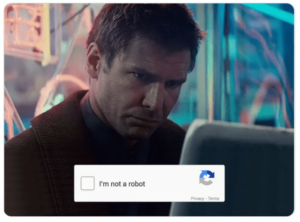Yes, AI can write. But it can’t tell your story.
As Taylor Berger scrawled across her sign in the early days of the Writers Guild of America protests, “AI doesn’t have childhood trauma.” Leave it to the WGA to have the cleverest placards in the business.
But while Ms. Berger’s sign aims to amuse, the debate around what role artificial intelligence (AI) should play in creating art (and yes, ahem, writing is an art, thank you very much) is dead serious – and it’s far from over. Visual artists have been suing AI companies left and right for using their creations without permission, and thousands of authors, from Sarah Silverman to Margaret Atwood, have recently joined the fray.
![]() While the writing we do in public relations and marketing differs slightly from what you might read in The Handmaid’s Tale (or, good grief, it should), our storytelling is no less creative, and it should also be no less original. In fact, the media is beginning to demand it – a colleague recently received a mass email from an online news outlet insisting that no more than 10% of any written submission be generated by AI.
While the writing we do in public relations and marketing differs slightly from what you might read in The Handmaid’s Tale (or, good grief, it should), our storytelling is no less creative, and it should also be no less original. In fact, the media is beginning to demand it – a colleague recently received a mass email from an online news outlet insisting that no more than 10% of any written submission be generated by AI.
They are right to demand it – and we should be demanding it of ourselves.
AI isn’t a replacement for insight and narrative.
Why? It’s not just because anything written by AI sounds like an instruction manual (although that’s part of it). It’s not even about originality or ethics (although those are urgent concerns worthy of today’s ongoing debates, protests, and lawsuits).
It’s because media outlets and marketing pros worth their salt understand that point of view – sharp, persuasive, provocative POV – is what resonates with readers and connects with customers. And storytellers like Ms. Berger know that a person’s unique POV – imbued with the wisdom that can only be gained by real life experience – could never be replaced by an algorithm.
Within Big Valley’s Story + Content practice, my colleagues and I find bliss in digging into that POV with our clients. (It’s a little bit therapy, it’s a little bit rock and roll.)
- We unearth how an executive’s experiences as a woman and a mother have stoked her passion for improving equity in clinical research.
- We excavate a founder’s childhood memories in his mother’s accounting practice, which spurred a revolutionary AI for finance professionals.
- We hit gold when we discover that a co-founder’s thoughts on fraud strategy are grounded in his past life as a professional blackjack player.
We take those stories – that wellspring of human struggle and triumph and hard-earned wisdom – and strategize which ones will resonate with the right audience at the right time.
Then, we use those stories to make meaningful customer connections and demonstrable commercial outcomes. And, doggone it, we make those stories sing.
AI can write, but can it imagine?

As we all swiftly descend into the hellscape promised in Will Smith’s 2004 chef-d’oeuvre I,Robot, preserving our human voices has never felt more important.
Okay, that was a little dramatic. And I’ve never seen I, Robot. Side question: Can AI tell a lie?
Here’s what is true: AI is tremendously exciting. It has the power to do so much good. Yes, even for artists: it can create a solid outline or help us power through writer’s block.
One day, I hope it will do my laundry.
But, for goodness’ sake, it should not be telling your story. Your experience is your own – it is sacred, it has meaning, it cannot be replicated. It is the rich, gritty, good stuff. And it’s what your fellow humans want to read.
Do you need help telling your story? Please feel free to reach out and see how Big Valley can help bring your POV to life.






